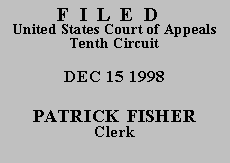

| LORENZO F. JIMENEZ, |
|
| v. | |
| JOHN M. HURLEY, J. GUADIAN, R. BAYSINGER,J. RYMER, G. L. HERSBERGER, PATRICK R. KANE, ED CROSLEY, JOHN R. SIMPSON, |
Lorenzo Fuentes Jimenez ("Petitioner"), an inmate appearing pro se, filed an application for a writ of habeas corpus with the district court, pursuant to 28 U.S.C. § 2241. The district court denied the application, as well as Petitioner's motion for leave to proceed in forma pauperis on appeal. The matter is now before us on Petitioner's renewed motion for leave to proceed without prepayment of costs or fees.
Petitioner has been incarcerated for over a decade for multiple instances of assault on correctional officers. In his § 2241 application filed with the district court, Petitioner alleged that he was unable to mount an administrative appeal from a decision denying him parole, because he was not given a copy of the United States Parole Commission's decision until the time for mounting such an appeal had passed. Federal regulations allow decisions of the Parole Commission to be appealed to the National Appeals Board, but such appeals "must be filed . . . within thirty days from the date of entry" of the decision of the Parole Commission. 28 C.F.R. § 2.26(a) (1998). Petitioner alleges that prison officials refused to give him a copy of the decision denying him parole until after the thirty-day period had expired.
The district court denied Petitioner's application, stating that, first, Petitioner's claim was not a challenge to the validity or execution of his sentence, and therefore was cognizable as a Bivens action but not under federal habeas, see Bivens v. Six Unknown Named Agents of the Federal Bureau of Narcotics, 403 U.S. 388 (1971), and second, even if Petitioner's claim were cognizable under federal habeas corpus statutes, it would fail anyway, because the record demonstrated that Petitioner was given a copy of the relevant decision on the very day it was received at the prison.
On appeal, Petitioner renews the arguments made before the district court, and, in addition, appears to allege that the Parole Commission's decision to deny him parole was erroneous. We address Petitioner's arguments in turn.
As to Petitioner's first claim, we need not decide whether the district court was correct when it stated that Petitioner's original allegation was not cognizable under federal habeas corpus statutes. We think that, regardless of whether Petitioner's application was properly presented to the district court, his claim fails. Petitioner's parole hearing occurred on December 6, 1995. The Parole Commission did not issue a decision denying parole until August 29, 1996; the prison received a copy of that decision on August 30, 1996, and Petitioner was given a copy of the document that same day. R. Doc. 3, Exh. A. The record clearly establishes that Petitioner's claim is meritless.(1)
Next, we address Petitioner's contention that the decision of the Parole Commission to deny him parole was erroneous. Petitioner makes this argument for the first time on appeal, and, because we do not consider claims not first presented to the district court, Walker v. Mather (In re Walker), 959 F.2d 894, 896 (10th Cir. 1992) (stating that "a federal appellate court does not consider an issue not passed upon by the court below"), we may not consider Petitioner's new argument. We note, however, that such objections are indeed properly brought as § 2241 petitions, but only after first exhausting administrative remedies, see Fuller v. Rich, 11 F.3d 61, 62 (5th Cir. 1994) (stating that "[a] prisoner challenging a Parole Commission decision is required to exhaust administrative remedies before seeking habeas relief in federal court"), and then making the argument to the district court in the first instance. Petitioner has done neither.
First, Petitioner has presented this court with no evidence that he appealed the Parole Commission's decision after receiving the notice on August 30, 1996, and does not argue that he comes within any of the established exceptions to the exhaustion requirement. Second, even if Petitioner could get around the exhaustion requirement, he cannot escape the fact that he simply did not present this claim to the district court, and because the district court had no opportunity to pass on the issue, we will not consider it.
Because Petitioner can make no "nonfrivolous argument on the law and facts in support of the issues raised on appeal," DeBardeleben v. Quinlan, 937 F.2d 502, 505 (10th Cir. 1991), we DENY his renewed motion for leave to proceed without prepayment of costs or fees, and DISMISS the appeal.
ENTERED FOR THE COURT
Stephen H. Anderson
Circuit Judge
*.This order and judgment is not binding precedent, except under the doctrines of law of the case, res judicata, and collateral estoppel. The court generally disfavors the citation of orders and judgments; nevertheless, an order and judgment may be cited under the terms and conditions of 10th Cir. R. 36.3
1.The Parole Commission also issued a different notice regarding Petitioner on January 3, 1996. The prison received a copy of this notice on January 30, 1996, and Petitioner claims he was not given a copy of this notice until October 1996, even though he requested one in May 1996. R. Doc. 3, at 8. Because the prison failed to give Petitioner a copy of this notice until five months after he requested one, Petitioner claims his rights were violated. Petitioner has simply confused the two notices. The January 1996 notice apparently was a decision stemming from a parole hearing that took place before the December 1995 parole hearing, and the notice contains only a short, two-sentence statement ordering Petitioner to participate in "anger control management counseling" and in an "in-patient or an out-patient mental health program." R. Doc. 3, Exh. B. The August 1996 notice, on the other hand, is the notice denying parole to Petitioner. R. Doc. 3, Exh. A.